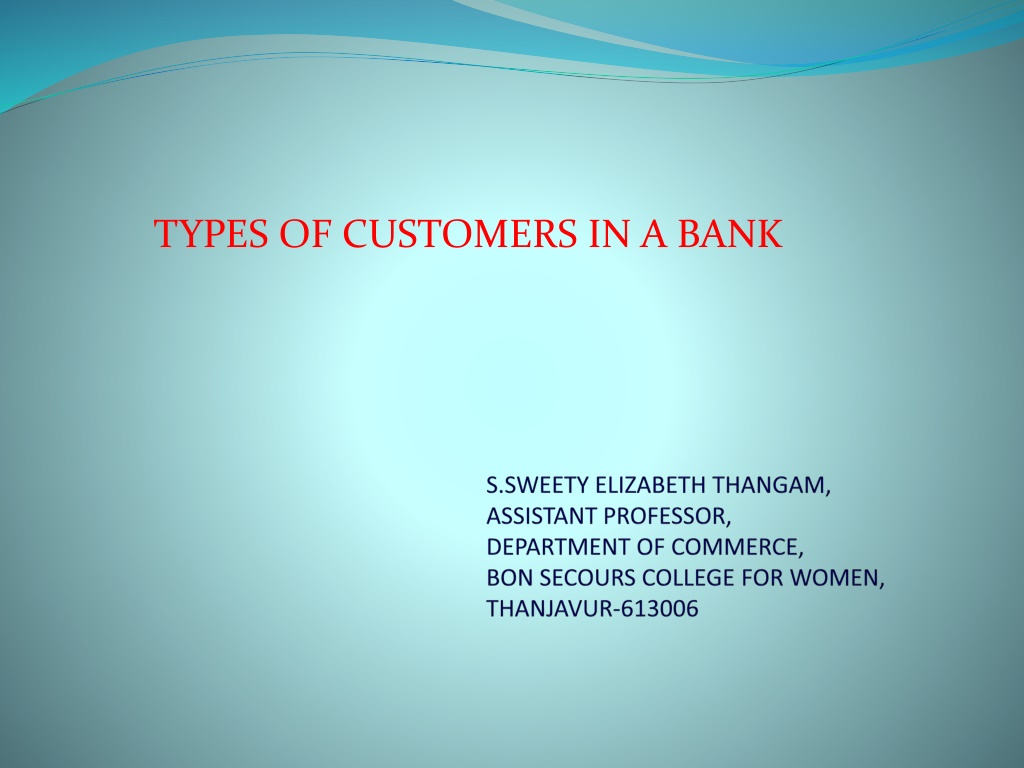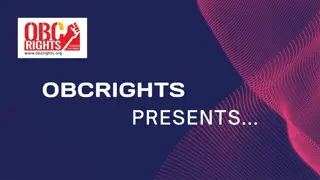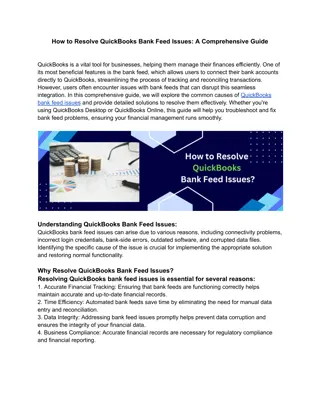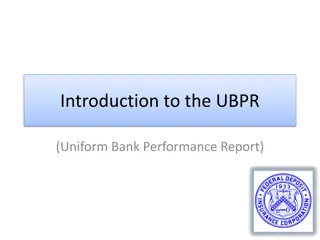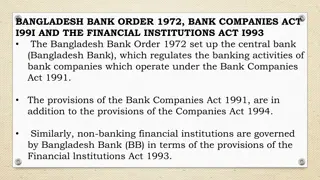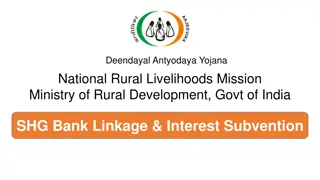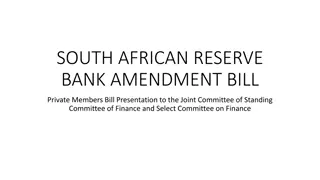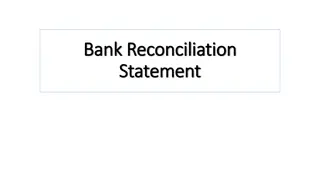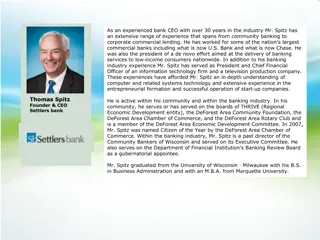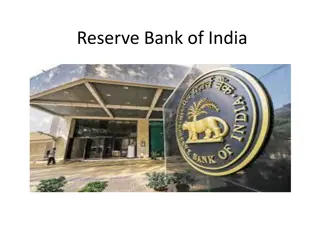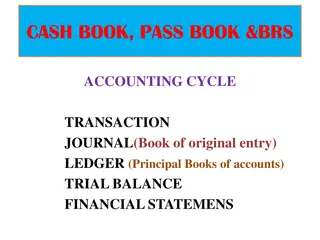Understanding Different Types of Customers in a Bank
A bank account can be opened by any person who meets specific conditions outlined by the bank. However, there are special types of customers with legal restrictions, such as minors, married women, pardanashin women, lunatics, illiterate persons, drunkards, trustees, executors, joint Hindu family, partnership firms, and joint stock companies. Each category has its unique considerations for the banker while conducting business. Minors have specific regulations based on the Indian Majority Act and Hindu and Muslim laws. Married women have the right to separate property and can open accounts in their own name. Pardanashin women have special considerations due to restrictions on their activities.
Download Presentation

Please find below an Image/Link to download the presentation.
The content on the website is provided AS IS for your information and personal use only. It may not be sold, licensed, or shared on other websites without obtaining consent from the author. Download presentation by click this link. If you encounter any issues during the download, it is possible that the publisher has removed the file from their server.
E N D
Presentation Transcript
An account in a bank can be opened by any person on satisfaction of the following conditions: (i) He must be competent to contract. (ii) He must apply to the banker in the proper manner. (iii) He must be a desirable person from the point of view of the banker for entering into business relation. However, the capacity of certain classes of persons to open a bank account is subject to some special legal restriction. Such of those persons are called as special types of banker s customers. Therefore, special precautions should also be taken by a banker while dealing with them.
TYPES OF CUSTOMER *Minor *Married women *Pardanashin women *Lunatic *Illiterate persons *Drunkard *Trustees *Executors and Administrators *Joint Hindu Family *Partnership Firm *Joint stock company
MINOR As per section 3 of Indian Majority Act, 1875, a minor is a person who has not attained the age of 18 years. A person will become major at the age of 18 whether guardian is natural orappointed bya court of law. Hindus : As per section 6 of the Hindu Minority and Guardianship Act, 1956, father is the natural guardian of a Hindu minor boy or an unmarried girl and after him, the mother. In case of a married Hindu minor girl, her husband is the natural guardian. If the husband is minor or minor girl becomes widow, her father in law and after him the mother in law will be the guardians though they are not natural guardian. Muslims : As per Muslim Personal law, father is the natural guardian. A Muslim father can appoint a testamentary guardian and even mother of a Muslim child can be testamentary guardian. If the father dies without leaving behind a will, father s grandfather is the guardian. However, the testamentary guardian appointed by the will of father will have priority over paternal grandfather. On the death of paternal grandfather, the person appointed by the will of the paternal grandfather will be guardian. If the father s father dies intestate, court can appoint a guardian. father i.e. paternal
MARRIED WOMEN Marriage of woman does not affect any right of her separate property. Section 14 of the Hindu Succession Act, 1956 provides that property of a Hindu female shall be her absolute property. A Married woman has a legal entity of her own, which is separate from her husband. According to the Hindu Marriage Act 1956,Hindu married women can have separate property in her own name. A married woman can open accounts in her own name, operate freely and enjoy overdraft limit as long as the liabilities are met out from her own property. At the time of opening the account in the name of a married woman the name and occupation of her husband, details of his employer is obtained and recorded. Some banks also obtain the maiden name of the married women. A married woman can make her husband liable for the overdraft enjoyed by her If she borrows money for the necessities of her life, If she borrows for the necessaries of her house hold, If sheacts as agent of he husband.
PARDANASHIN WOMEN A pardanashin women is a women who puts a veil and does not show her face to people /outsiders and observes complete seclusion. Even they do not pose for photographs. Contract entered Pardanashin Woman is not a contract free from all defects. Banks generally refuse to open accounts in the name of Pardanashin Women, because identity of Pardanashin Women cannot be observescomplete seclusion. However, if circumstances, such an account is opened, two respectable persons known to the branch invariably attest the signatures on the account opening form withdrawals by withdrawal slips. into by a ascertained as she under special and on the
LUNATIC As per Contract Act, a person of unsound mind is not capable of entering into a valid contract. Banks therefore, do not knowingly open an account in the name of a person of an unsound mind. In case of an existing account, as soon as the information about insanity of the accountholder s is received, banks suspend stop operations in the account and do not pass cheques. When the proof of customer's sanity is received, accountare resumed. An account in the name of a lunatic person can be opened or operated only by a guardian appointed competent Court and the balance of such accounts is paid to the person appointed by thecompetentcourt. operations in the by a
ILLITERATE PERSONS Those who are unable to sign but use thumb impression are illiterates for banks. Illiteracy does not make a person incompetent to contract. Therefore an illiterate person can open and operatea bank account. However, banks do not open current account of illiterate person. For opening an account the person has to come to bank personally along with a witness who is known both to the depositor and to the bank. While opening an account banks obtain left hand thumb impression of illiterate men and right hand thumb impression of illiterate female. The thumb impression is obtained in the presence of a person known to the The thumb impression is to be witnessed by a customer of the bank and noting to this effect is done (left/right thumb impression of Mr./Ms. affixed in my presence). Photograph of the account holder is obtained which is affixed on the ledger folio, account opening form and pass book. Normally, no cheque book is issued to the account holder. The account holder has to come to the bank for operating the account. After proper identification banks pay the amount to the account holder. All other terms and conditions applicable for opening an account also apply in this case. Banks are required to explain the terms and conditions governing theaccount to the illiterate. bank and the depositor.
DRUNKARD Intoxicated person cannot take a rational judgment about his interest. State of intoxication renders a person incapable of understanding the natureof his action. Therefore, the law provides that all the contracts made by a person in a drunken state are void. When a drunkard approaches the branch of a bank for opening an account, the branch if satisfied that the person is incapable of entering into a contract refuses to open the account as a precautionary measure. In case of an existing account, payment of a cheque to a drunkard is done after taking properwitness.
TRUSTEES As per Sec.3 of Indian Contract Act, 1882 A trust is an obligation annexed to the ownership of property, and arising out of a confidence in and accepted by the owner, or declared and accepted by him, for the benefit of another, or of another and the owner. Bank opens trust accounts for good parties. A trust can be public or private. All public trusts are required to be registered with the Charity Commissioner under Public Trust Actof the respective state. Trust accounts must be opened and conducted strictly in accordance with the terms of the trust deed. All the trustees are required to act jointly by the persons so authorised by the registered trust deed. Trustees have no powers to delegate their authority to one or more unless the power of delegation is authorised by the trust deed or is in accordance with the directions of the court on an application made by the trustees.
EXECUTORS AND ADMINISTRATORS An administrator drives power to deal with the estate of the deceased from the letters of administration issued by the Court. The estate of the deceased vests in the executorfrom that dateof lettersof administration. Banks generally do not permit an executor to deal with the moneys or securities of the deceased until he produces the probate as the evidence for his title. In law, executorsand administrators constitutea singleperson. In the absence of any mandate to the contrary, either or any one of the two or more executors or administrators can open and operate the account and deal with the estate of the deceased without a written authority from the others. Bank obtains account opening form duly signed by all the executors or administrators and obtains clear instructions as to the manner in which the account will be operated. Bank also obtains copy of probate or letters of administration in original for scrutiny and registration in their books. Bank ascertains administrators for theirsatisfaction. identity of executors or
JOINT HINDU FAMILY Joint Hindu Family (JHF) (also known as Hindu Undivided family) is a legal entity and is unique for Hindus. It has perpetual succession like companies; but it does not require any registration. The head of JHF is the Karta and members of the family are called co-parceners. The JHF business is managed by Karta. The account is opened in the name of the Karta and family business. The Karta and all the adult members of the HUF are required to sign the account opening form. Banks do not open Savings Bank account of HUF engaged in trading and business activities. The operations in the account are normally restricted to Karta of the family. The Karta can appoint any of the adult coparceners to operate the bank account as 'Manager' if JHF carries out business at various places through its branches.
PARTNERSHIP FIRM A partnership independent of partners. It is an association of persons. Registration of a partnership is not compulsory under Partnership Act. However, many banks insist on registration of a partnership. In any case, is stamped partnership deed or Partnership letter should be taken when an account is opened for a partnership. The partnership deed will contain names of the partners, objective of the partnership, and other operational details, which should be taken noteof by the bank in its dealings. A partnership firm can open all types of accounts except savings bank account. Bank opens account of a partnership firm in the name of the firm and not in the names of partners individually or jointly. The account opening form is signed by all the partners in their individual capacity as well as in the capacity of a partnertoensure jointand several liabilities. While opening the account banks verify the partnership deed to examine whether any clause of the deed is detrimental to the interest of bank. Since bank would not like to be bound by the terms of the partnership deed, banks do not accept the partnership deed even if offered. is not a legal entity
JOINT STOCK COMPANY A company is registered under companies Act has a legal status independent of that of the share-holders. A company is an artificial person which has perpetual existence with limited liability seal. Memorandum and Articles of Association, Certificate of Incorporation, Resolution passed by the Board to open account, name and designations of persons who will operate the account with details of restriction placed on them are the essentials documents required to open an account. *Public Ltd. Co.: It can issue shares to public. Minimum number of shareholders required is 7. There is no restriction in the maximum number of shareholders. Shares can be freely transferred. Minimum number of directors required is 3 Requires certificateof commencement of business *Private Ltd.Co.: It can not issues shares to public. Shares are not freely transferable. Minimum number of shareholder required 2 and maximum number of share holders can be 50. Minimum number of directors required 2. It does not requirecertificate of commencement of business. *Government Co.: A company where not less 51% of the share capital is Depending upon the liability of shareholders the Company it may be limited or unlimited. and common held by the government.
